The Global Forum on Digital Transformation in TVET (Shenzhen) 2025 was successfully held on 11-12 November 2025 at Shenzhen Polytechnic University (SZPU), China. Under the theme “Accelerating TVET Transformation with Emerging Tech for an Inclusive and Intelligent Future,” the forum convened around 140 participants from 36 countries, including TVET policymakers, leaders, educators, and experts from international organizations, research institutions, and high-tech companies.
The event was organized and hosted by the UNESCO Chair on Digitalization in TVET at SZPU, and was co-organized with the UNESCO-UNEVOC International Centre for TVET, UNESCO Regional Office for East Asia, UNESCO Regional Office for Southern Africa, International Centre for Higher Education Innovation under the auspices of UNESCO (UNESCO-ICHEI), UNESCO International Research and Training Centre for Rural Education (UNESCO INRULED), and International Centre for UNESCO ASPnet (ICUA). The forum was supported by industry partners including Huawei Technologies Co., Ltd. and BYD Company Ltd.
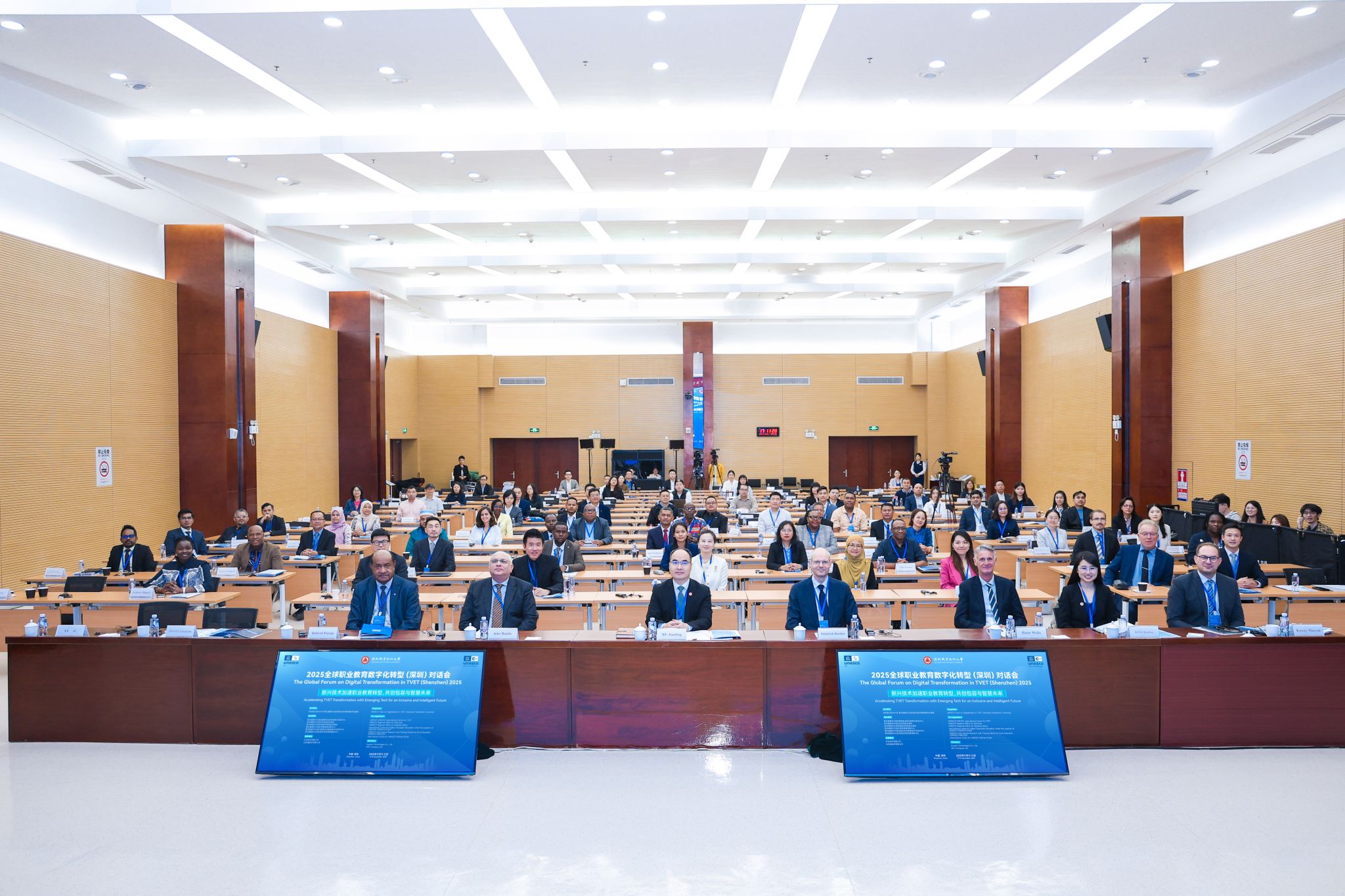
Group photo of participants
High-Level Opening Remarks
The opening ceremony featured high-level opening remarks from Mr. Qin Changwei, Secretary General of the Chinese National Commission for UNESCO; Ms. Luo Yuanyuan, Director of the Secretariat of the Foreign Affairs Office of Shenzhen Municipal People’s Government; Mr. Shahbaz Khan, Director of UNESCO Regional Office for East Asia; Mr. Brilliant Habeenzu, Permanent Secretary of the Ministry of Technology and Science of Zambia; and Mr. Xu Jianling, President of Shenzhen Polytechnic University and Chairholder of the UNESCO Chair on Digitalization in TVET. The speakers highlighted the pivotal role of digital transformation in shaping the future of education and industry, with particular emphasis on fostering inclusivity, sustainability, and global collaboration in TVET.
Keynote Presentations
Following the opening ceremony, two keynote presentations set the stage for the forum’s discussions. Mr. Peter Wells, Head of Education at the UNESCO Regional Office for Southern Africa, delivered a presentation titled “TVET: The Titan of Tertiary Education: Navigating the Cosmos of Artificial Intelligence vs Authentic In(abilities).” Mr. Wells called for global attention to the critical role of TVET within the broader higher education system, while exploring the tension between artificial intelligence capabilities and authentic human abilities in the TVET context.
Mr. Xu Jianling, President of SZPU and Chairholder of the UNESCO Chair on Digitalization in TVET, presented “AI-Driven Transformation of TVET: Shenzhen Practice and Global Partnerships.” He emphasized that as AI reshapes the global industrial landscape and makes human-machine collaboration an irreversible trend, TVET must shift to a “competency-based” paradigm focusing on cultivating students’ AI literacy and innovation capabilities. Mr. Xu then detailed SZPU’s key approaches to integrating AI into the entire institutional practices and its international cooperation framework centered on digital transformation.
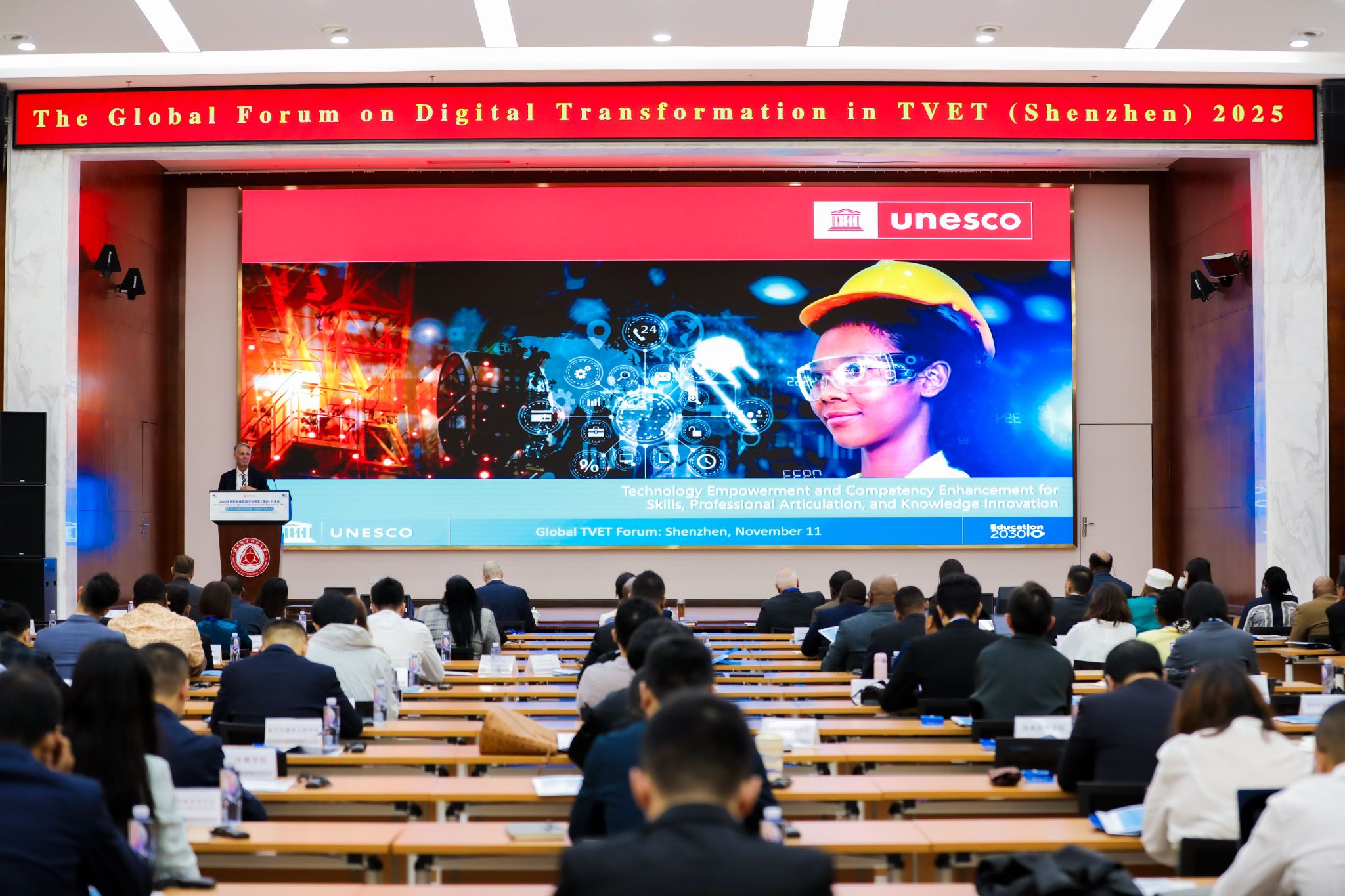
Mr. Peter Wells delivering a keynote presentation
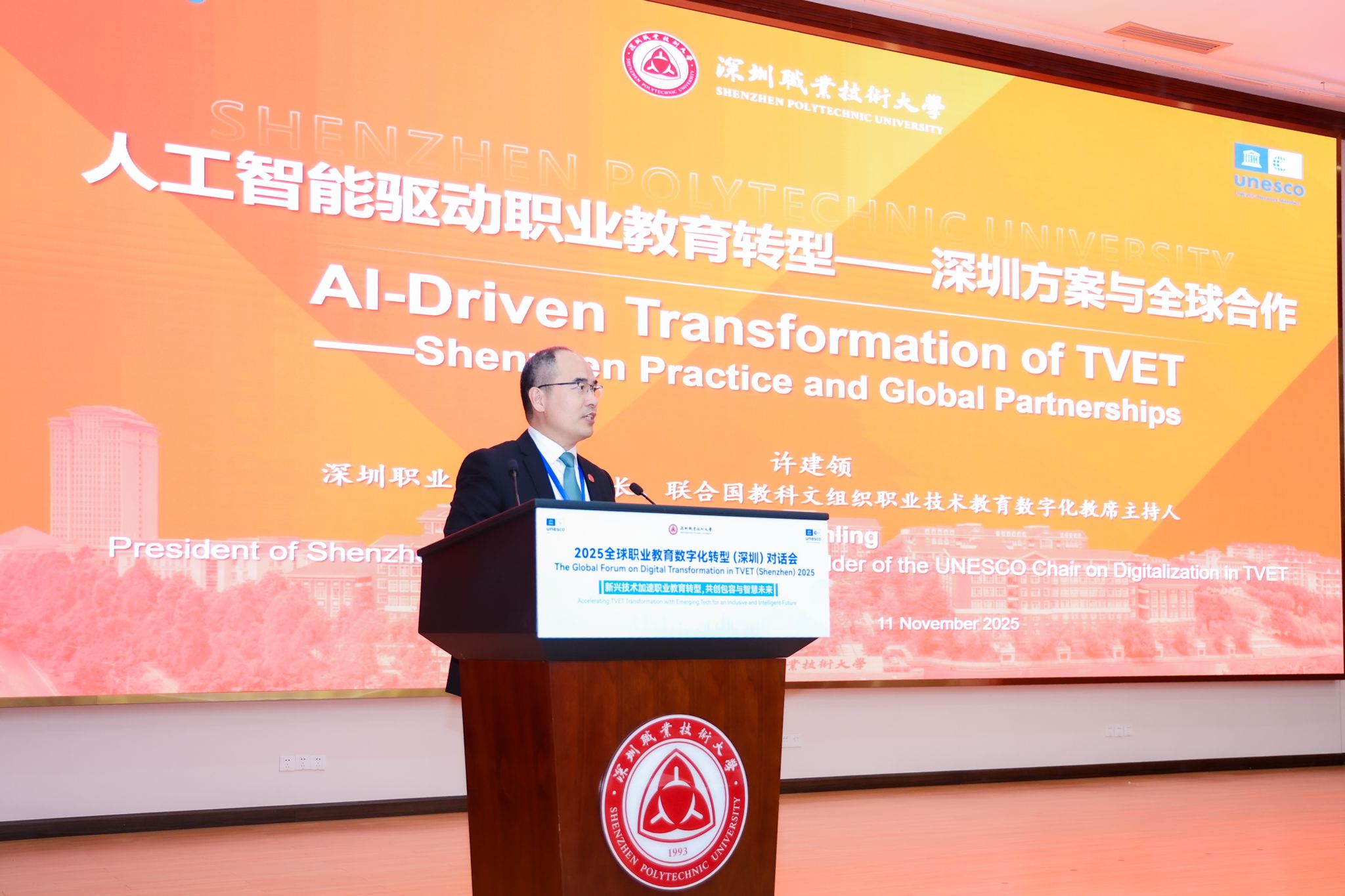
Mr. Xu Jianling delivering a keynote presentation
Session 1: Developing New Qualifications and Competencies for TVET in the Age of AI
Organized by UNESCO-UNEVOC, this opening session explored critical questions for the future of TVET with a keynote presentation by Mr. Friedrich Huebler, Head of UNESCO-UNEVOC, on “New qualifications and competencies for TVET in the age of AI.” Mr. Huebler emphasized the urgent need for TVET systems to adapt to AI and the dual green and digital transitions reshaping global skills demand. He introduced the “UNESCO Global Skills Tracker,” a new tool launched in 2025 to analyze real-time skills demand for AI and green jobs. He also announced the development the “Guidelines for integrating AI in TVET,” a joint initiative by UNESCO-UNEVOC, Shenzhen Polytechnic University, and Otto-von-Guericke University Magdeburg.
Following the keynote, a panel discussion explored the session’s theme in depth, featuring insights from Mr. Friedrich Huebler, Mr. Hannes Tegelbeckers (Otto von Guericke University Magdeburg, Germany), Mr. Yang Congkun (Shenzhen Polytechnic University), Mr. Sello Mokoena (University of South Africa), and Ms. Twaambo Chiinza (Technical and Vocational Teachers’ College, Zambia). The panelists discussed critical issues including the identification of AI-related skills and competencies, their integration into TVET curricula, innovative assessment and delivery methods, policies on digitalization and AI use in TVET, and ensuring equity and access in AI-enabled learning environments.
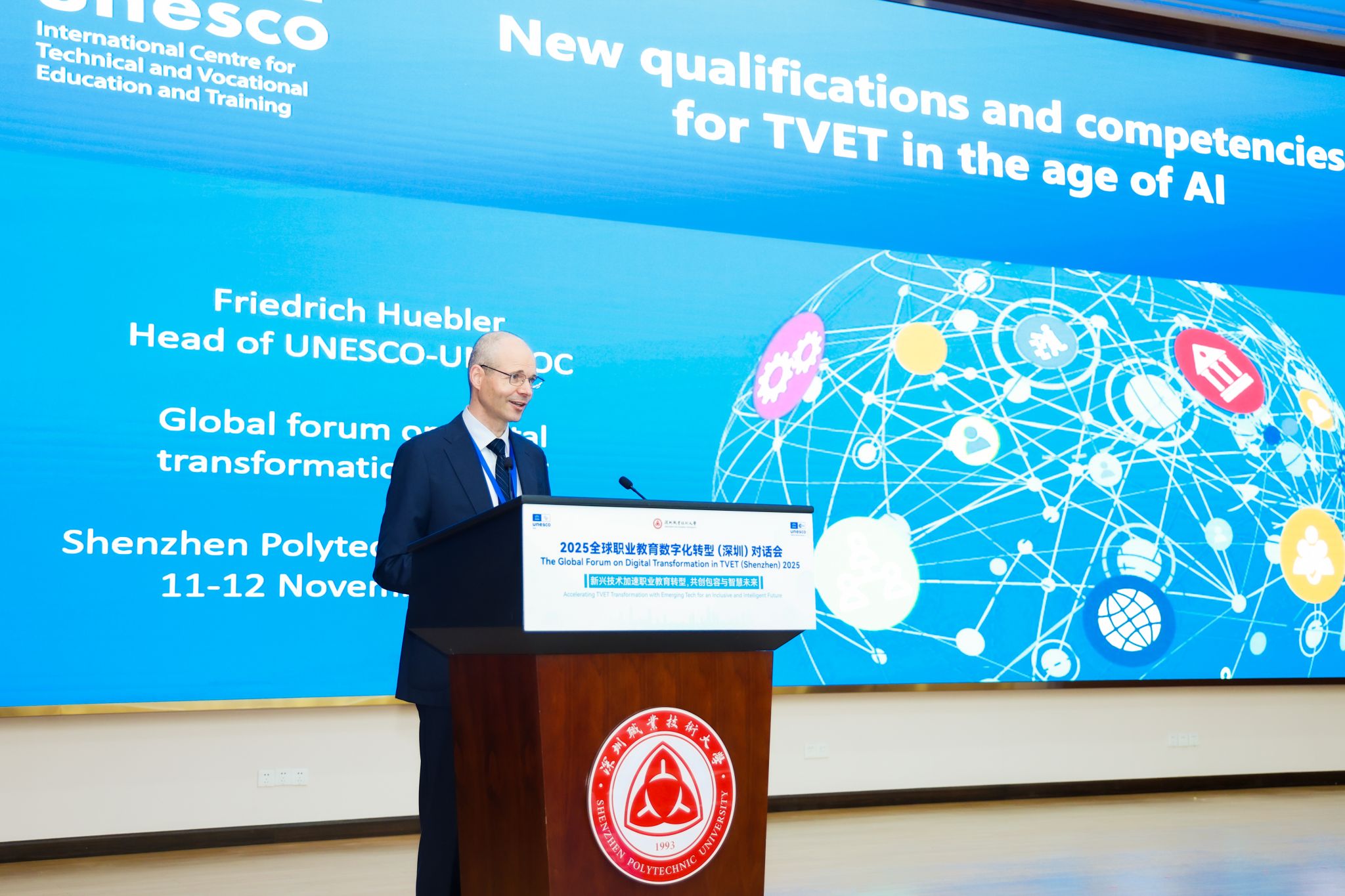
Mr. Friedrich Huebler delivering a keynote presentation
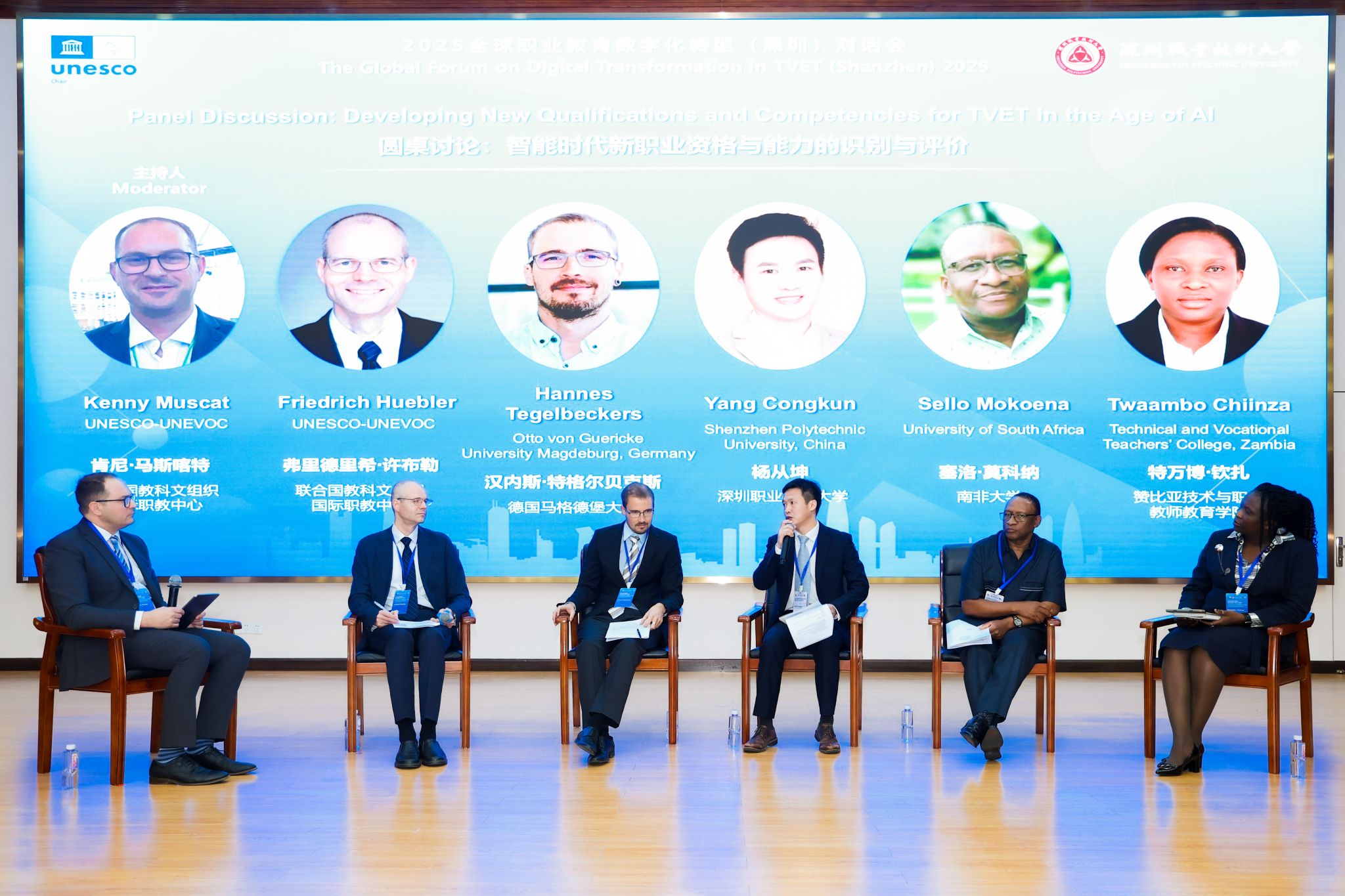
Panel Discussion
The day’s discussions continued with three additional thematic sessions:
Session 2: Innovative Approaches to AI Integration in TVET Teaching and Learning
This session explored innovative pedagogical approaches for integrating AI into teaching and learning. Presentations featured Mr. LIM Cher Ping, Chair Professor from the Education University of Hong Kong, on “Higher Education Teacher Competencies in the GenAI Era”; Ms. D’oria Islamiah Rosli, Associate Professor from Universiti Tun Hussein Onn Malaysia, who discussed “Innovative Approaches to AI Integration in TVET Teaching and Learning”; and Mr. Huang Ronghuai, Professor from Beijing Normal University and Chairholder of the UNESCO Chair on Artificial Intelligence in Education, who spoke on “Fostering the Sustainability of Transforming TVET with Digital and Intelligent Technologies.”
Session 3: Industry-Education Integration for Skills Development in the Intelligent Economy
Focusing on the critical link between university and the economy, this session highlighted models for industry-education integration. Speakers from leading technology and manufacturing firms shared insights on building collaborative ecosystems. Presenters included Mr. Zhang Chengtao, Vice President of Global Public Sector BU at Huawei Technologies Co., Ltd., on “Digital Transformation of Vocational Education & Cultivation of Vocational Talents”; Mr. Ye Zi, General Manager of Human Resources Division at BYD Company Ltd., on “Integration of Industry and Education: BYD’s Co-creation Journey with the Digital Ecosystem of Vocational Education”; and Mr. Jin Shanguo, Chairman and President of Beijing Wenhua Online Education Technology Co., Ltd., on “The Sustainable Development Powered by New Educational Infrastructure.”
Session 4: Strengthening Global Collaboration for Equitable, Inclusive and Intelligent TVET Systems
The final session broadened the scope to strengthening global collaboration for an equitable and intelligent TVET ecosystem. Experts shared national and institutional strategies and models for international cooperation, with insights from Mr. Amr Bosila, Head of the Central Administration for the Development of Technical Education, Ministry of Education and Technical Education of Egypt, on the “Reform of Technical Education in Egypt”; Ms. Bi Xiaohan, Deputy Director of UNESCO-ICHEI, on “Developing a Collaborative TVET Ecosystem to Cultivate Future-Ready Talent”; Mr. Martin Fleischer, Director of the Sino-German Higher Vocational Education Innovation Centre at Shenzhen Polytechnic University, on “Sino-German Co-Innovation: Building Inclusive and Smart TVET Best Practices”; and Ms. Liu Tianyi, Programme Coordinator at UNESCO INRULED, on “Empowering Her Digital Future: Pathways to Girls’ Digital Literacy in TVET.”
The first day of the forum concluded with remarks from Mr. Friedrich Huebler, Head of UNESCO-UNEVOC, who summarized the key takeaways from the discussions and reinforced the shared commitment to advancing TVET transformation.
Exhibition of Research Outcomes and OERs
The forum showcased a comprehensive series of research outcomes and open educational resources (OERs) developed by the UNESCO Chair on Digitalization in TVET to serve as public goods for advancing TVET transformation globally. These resources include 28 programme syllabuses and 96 curriculum syllabuses in digital technologies, two research reports on TVET digital transformation, 32 open online courses in digital technology, a collection of 100 promising practices of digital transformation in TVET, and 104 digital transformation scenarios in TVET. These resources can provide useful references for TVET institutions to enhance their capacity in digital transformation and AI integration.
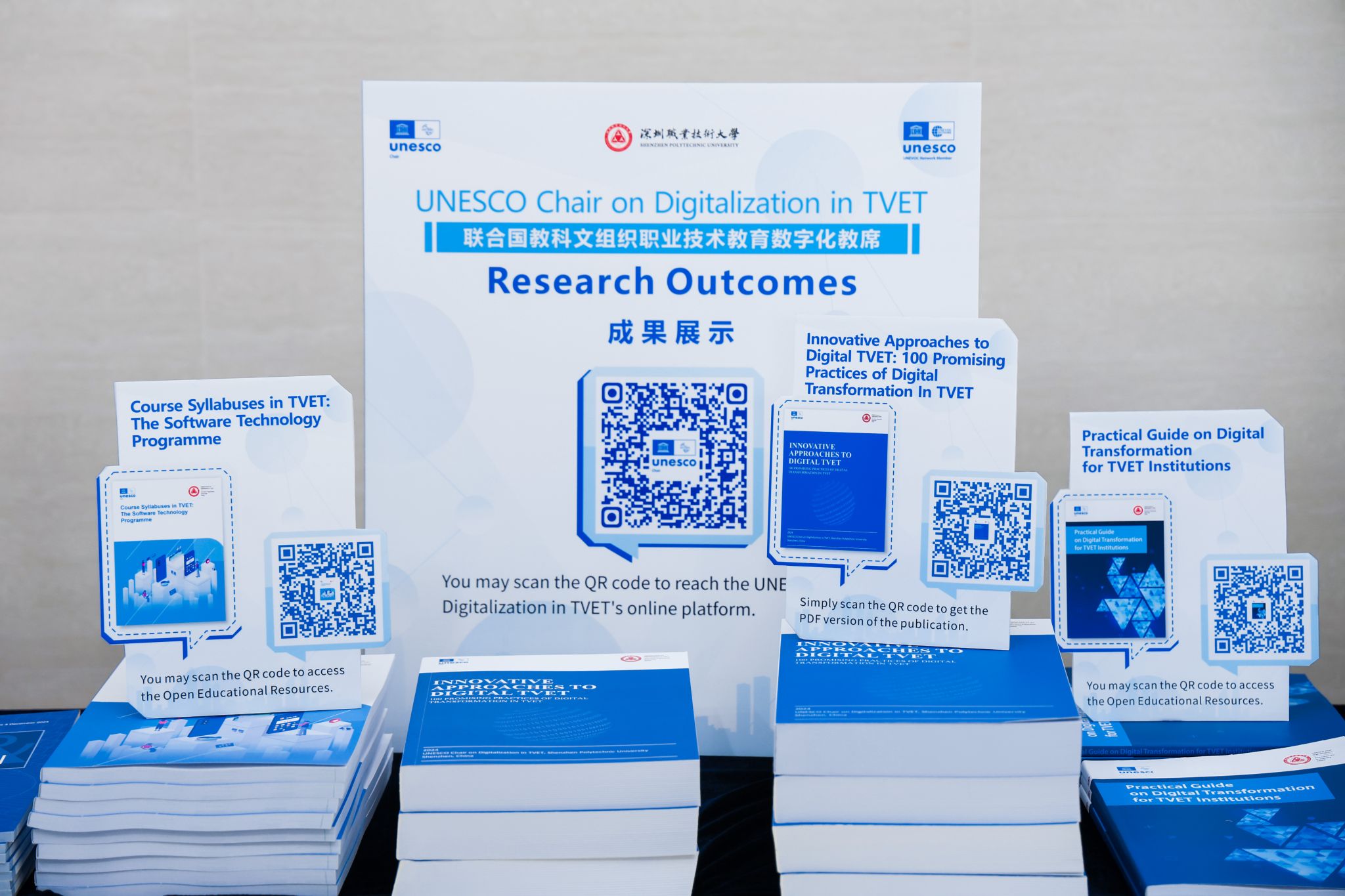
Exhibition of Research Outcomes and OERs
Exploring Digital Transformation Scenarios
On the second day of the forum, participants gained practical insights into TVET digital transformation through guided visits and demonstrations. They first visited Huawei to explore the company’s innovative solutions for advancing intelligence across healthcare, transportation, manufacturing, and education sectors. This was followed by a tour of Shenzhen Polytechnic University’s digital training facilities, where participants observed firsthand the integration of cutting-edge technologies into TVET teaching and learning environments.
The two-day forum provided a vital platform for policy dialogue, knowledge exchange, and demonstration of practical solutions. By bringing together diverse perspectives, the event strengthened international networks and established sustained partnerships that will enable ongoing dialogue, peer learning, and collaborative efforts for advancing TVET in an increasingly digital and intelligent world.
